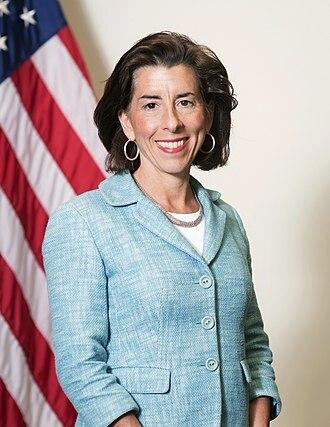The United States Secretary of Commerce Gina Raimondo spoke to Georgetown University students Feb. 23 to discuss department efforts to increase U.S. manufacturing capabilities and the future of technology.
Raimondo, the current secretary of commerce and former governor of Rhode Island, delivered individual remarks in the Lohrfink Auditorium at the McDonough School of Business before participating in a moderated question-and-answer session. Raimondo largely discussed the importance of the 2022 Creating Helpful Incentives to Produce Semiconductors Act (CHIPS), which aims to establish the United States as a semiconductor-manufacturing superpower by allocating federal funds to subsidize companies within the industry.
Vice President Kamala Harris swore in Raimondo two months after President Joe Biden’s inauguration. Before serving as secretary of commerce, Raimondo graduated from Harvard University, Oxford University as a Rhodes Scholar and Yale Law School.
Raimondo said the CHIPS Act will be vital to the longevity and future of technological manufacturing in the United States, given America’s loss of semiconductor jobs to countries like Taiwan, which produces 92% of the world’s most advanced chips.
“The research, innovation and manufacturing sparked by this law will enable the U.S. to be the technological superpower,” Raimondo said at the event. “The money is intended to incentivize companies to manufacture semiconductors in America.”
Raimondo said several key U.S. traits, like a commitment to innovation, have allowed it to maintain a significant technological influence in the global market over the years.

“We have always been a nation of invention, entrepreneurship and innovation,” Raimondo said. “That’s our edge. We have to keep that edge.”
Focusing on educating traditionally underrepresented groups in chip technology through high schools and community colleges will be key to the future of the industry, according to Raimondo.
“To meet the demand of the industry, I am calling on semiconductor companies and their supply chain to work with high schools and community colleges to train 100,000 new technicians in the next decade through creative apprenticeships, career and technical education and career programs,” Raimondo said. “This is doable.”
Raimondo said that universities need to also recruit historically underrepresented groups and encourage technical degrees so that they can jumpstart their careers in the industry and boost the economy as a whole.
“These colleges and universities have to expand their recruitment pipelines so that women, people of color, veterans and underserved communities can get these degrees and launch their careers,” Raimondo said. “I am challenging us and calling on colleges and universities to triple the number of graduates in semiconductor related fields, including engineering. This isn’t a political agenda. This is math.”
Given the vast growth and power of modern technology, it is important to keep such technology out of the hands of those with bad intentions, according to Raimondo.
“AI and quantum cloud, big data, the foundation of chips — every one of those technologies can be used for good or, in the wrong hands, can be used for malign purposes like we’ve never seen,” Raimondo said.
Raimondo also said that the CHIPS Act and semiconductor manufacturing are integral parts of U.S. foreign policy.
“This is fundamentally a national security initiative,” Raimondo said. “The return on our investment is the achievement of national security goals.”
“I am here to issue a call to all of America — public sector, private sector, private investors — to get in the boat, row with us, achieving this mission and invest in the CHIPS industry. Invest in the supply chain. Invest in the talent,” Raimondo said.





















